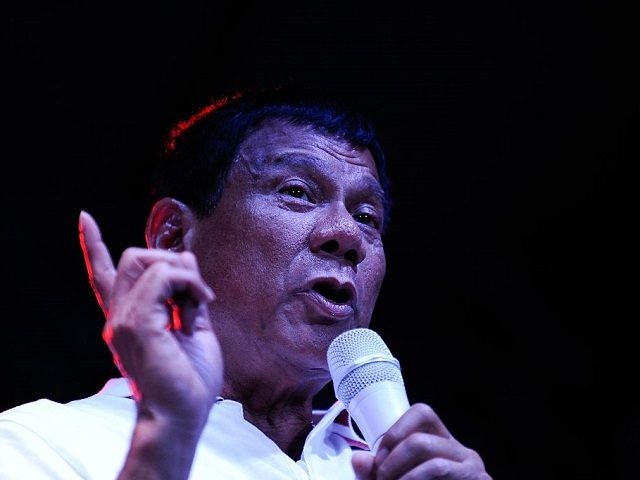Philippine President Rodrigo Duterte said “goodbye” to ties with the United States while in Beijing this week, leaving both Washington and much of the world “baffled,” according to the State Department, as Duterte offered no explanation regarding what that goodbye actually means.
“It isn’t just the United States who is baffled by this rhetoric,” State Department spokesman John Kirby said Thursday. “We have heard from many of our friends and partners in the region who are likewise confused about where this is going.”
He added that the United States is currently “seeking an explanation of exactly what the president meant” during his trip to China.
Earlier this week, Duterte said it was “time to say goodbye” to the United States. “I announce my separation from the United States both in the military … not social, but economics also. America has lost,” he declared. To China, he said, “I’ve realigned myself in your ideological flow and maybe I will also go to Russia to talk to (President Vladimir) Putin and tell him that there are three of us against the world – China, Philippines and Russia. It’s the only way.”
The sentiment was not new; Duterte has been threatening to “cross the Rubicon” with Washington for some time, and calling Xi and Putin future “close friends.” His tone with both the communist government of China and the rogue Putin regime has been far more conciliatory than that towards President Barack Obama, whom Duterte has told to “go to hell” and called a “son of a whore” on multiple occasions.
The new setting for Duterte’s message, however – right next to Xi Jinping – has alarmed the world. American Ambassador to the Philippines Philip Goldberg, to whom Duterte has referred as an “annoying homosexual son of a bitch,” told reporters Friday that he expects his government will demand some explanation. “Quite frankly, I don’t know what he means by a separation. … Our relationship on the economic side is very strong so we need further clarification on that,” he said.
It is not entirely clear that Duterte’s cabinet knows what Duterte meant by his “goodbye” any more than American officials do. Foreign Affairs Secretary Perfecto Yasay, Jr., explained this week that Duterte meant “separation from the economic and defense dependence of the past” earlier this week, while Duterte’s trade minister, Ramón López, essentially rejected his remarks entirely.
“Let me clarify. The president did not talk about separation,” López said on CNN.
“In terms of economic (ties), we are not stopping trade, investment with America. The president specifically mentioned his desire to strengthen further the ties with China and the ASEAN [Association of Southeast Asian Nations] region which we have been trading with for centuries,” he explained.
Presidential spokesman Ernesto Abella sounded more like the trade minster than his boss when asked about the situation also, claiming Duterte wanted to “separate the nation from dependence on the U.S. and the West and rebalance economic and military relations with Asian neighbors,” not cut all diplomatic ties.
But Duterte himself has, on multiple occasions, demanded that the U.S. military leave the Philippines, implying that he is not looking to merely expand trade with China and Russia. And in an official joint statement following Duterte’s visit to China, there is no indication that Duterte challenged China for usurping its territory in the South China Sea and colonizing it, building artificial islands and loading them up with military equipment. Instead, the statement claims the two world leaders had “a fruitful meeting in an amicable and friendly atmosphere,” where they agreed to “enhance cooperation between their respective Coast Guards, to address maritime emergency incidents, as well as humanitarian and environmental concerns in the South China Sea.”

COMMENTS
Please let us know if you're having issues with commenting.